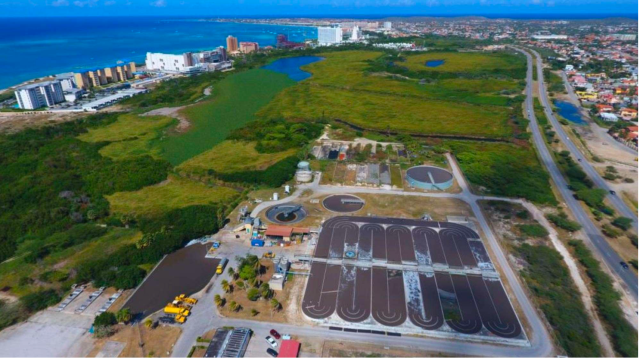Bill to privatize the RWZI sent to Parliament
ORANJESTAD - It's no secret that the RWZI plant in Bubali has been exceeding its capacity for years, causing disturbances in the nearby area. Despite substantial growth in tourism, the plant capacity has never kept pace with developments in the sector.
There was significant relief at the RWZI plant during the pandemic when the border was closed, and there were no tourists. However, with the growth of tourism after the pandemic, the strain on the RWZI plant's capacity once again exceeded its limits, with all the associated consequences. Despite various investments in the plant over the years, the lack of sufficient public funding has limited efforts to address the purification process challenges. The plant has been causing disturbances in the neighborhood and has worsened recently.
Meanwhile, the government has established a steering committee between the Ministry of Nature, Infrastructure, and Energy, tasked with privatizing the RWZI plant, as this is considered the only solution. In this regard, the state-owned company Utilities Aruba has expressed its willingness to take over the plant and thus assist the government in addressing this urgent problem.
The essence of privatization
In September 2023, the Council of Ministers approved the proposal to transfer the operation and ownership of the RWZI (Bubali, Parkietenbos, and Zeewijk), sewerage system, and incinerator to Aruba Wastewater Sustainable Solutions NV, a subsidiary of Utilities.
Indirectly, the company will be 100% owned by the government of Aruba. The company, Aruba Wastewater Sustainable Solutions NV (AWSS), has already prepared a business plan and a strategic plan for the short and long term on how to make the takeover of the plant and everything else involved public. Royal HaskoningDHV created all of the blueprints and paperwork.
The transfer of the properties of RWZI to AWSS comprises Afl. 31.8 million. AWSS will repay this to Aruba through the ground lease canon for an annual amount of Afl. 582,267.51 for 60 years, considering all the risks AWSS will face in taking over this plant.
For a new RWZI plant with a much larger processing capacity, AWSS will need to invest substantial amounts (of capital expenditure CAPEX and operational expenditure OPEX) as determined in the short and long-term strategic plan. To finance this, AWSS will need funding, for which the government will have to increase the environmental levy (Bijzondere belasting op verblijf), a levy paid by tourists to the hotels, to cover the costs (CAPEX and OPEX).
Aruba will agree with Utilities/AWSS to establish a "regulatory framework" and a "regulatory body" to ensure AWSS complies with the rules. There will be a regulatory body consisting of the Department of Nature and Environment (DNM), the Department of Public Health (DVG), the Department of Public Works (DOW), and a representative of the Ministry of Nature.
The RWZI privatization bill was meanwhile sent to Parliament. Preparation has taken a long time, considering the project magnitude, and the Aruba government hopes that, given the urgency to address the situation of the RWZI plant, they will prioritize this bill. Meanwhile, the government continues its efforts to minimize the nuisance caused by the RWZI plant.

